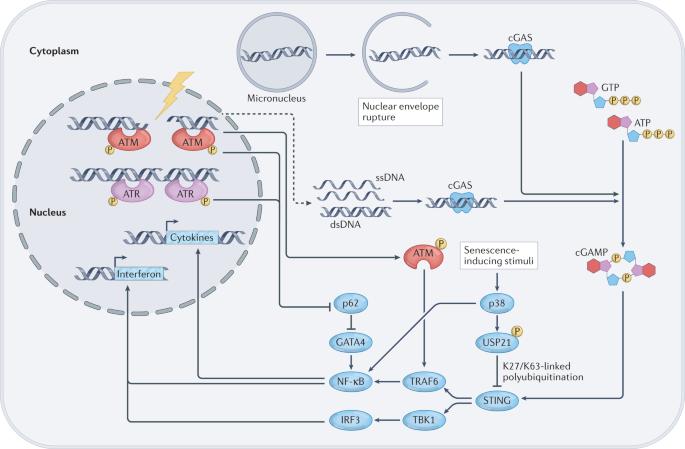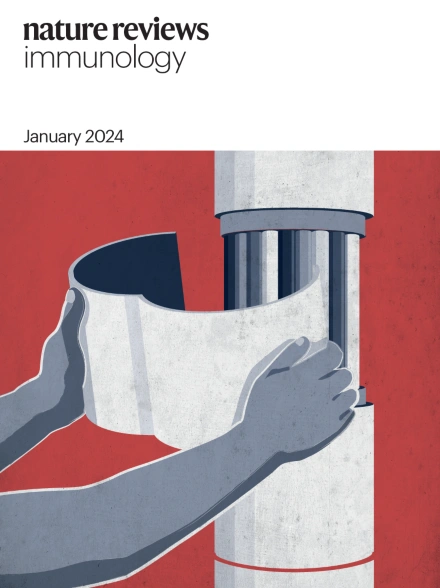DNA damage and repair in age-related inflammation
IF 60.9
1区 医学
Q1 IMMUNOLOGY
引用次数: 32
Abstract
Genomic instability is an important driver of ageing. The accumulation of DNA damage is believed to contribute to ageing by inducing cell death, senescence and tissue dysfunction. However, emerging evidence shows that inflammation is another major consequence of DNA damage. Inflammation is a hallmark of ageing and the driver of multiple age-related diseases. Here, we review the evidence linking DNA damage, inflammation and ageing, highlighting how premature ageing syndromes are associated with inflammation. We discuss the mechanisms by which DNA damage induces inflammation, such as through activation of the cGAS–STING axis and NF-κB activation by ATM. The triggers for activation of these signalling cascades are the age-related accumulation of DNA damage, activation of transposons, cellular senescence and the accumulation of persistent R-loops. We also discuss how epigenetic changes triggered by DNA damage can lead to inflammation and ageing via redistribution of heterochromatin factors. Finally, we discuss potential interventions against age-related inflammation. In this Review, Gorbunova and colleagues discuss the links between DNA damage, inflammation and ageing. They focus on the implications for premature ageing syndromes and multiple age-related diseases, and highlight potential therapeutic targets.

与年龄有关的炎症中的 DNA 损伤和修复
基因组不稳定性是导致衰老的一个重要因素。DNA 损伤的积累被认为会诱发细胞死亡、衰老和组织功能障碍,从而导致衰老。然而,新的证据表明,炎症是 DNA 损伤的另一个主要后果。炎症是衰老的标志,也是多种老年相关疾病的驱动因素。在此,我们回顾了 DNA 损伤、炎症和衰老之间的联系,强调了早衰综合征与炎症的关联。我们讨论了 DNA 损伤诱导炎症的机制,如通过激活 cGAS-STING 轴和 ATM 激活 NF-κB。激活这些信号级联的诱因是与年龄有关的 DNA 损伤积累、转座子激活、细胞衰老和持久性 R 环的积累。我们还讨论了 DNA 损伤引发的表观遗传变化如何通过异染色质因子的重新分布导致炎症和衰老。最后,我们讨论了针对与年龄有关的炎症的潜在干预措施。在这篇综述中,戈尔布诺娃及其同事讨论了DNA损伤、炎症和衰老之间的联系。他们重点讨论了早衰综合征和多种老年相关疾病的影响,并强调了潜在的治疗目标。
本文章由计算机程序翻译,如有差异,请以英文原文为准。
求助全文
约1分钟内获得全文
求助全文
来源期刊

Nature Reviews Immunology
医学-免疫学
CiteScore
93.40
自引率
0.40%
发文量
131
审稿时长
6-12 weeks
期刊介绍:
Nature Reviews Immunology is a journal that provides comprehensive coverage of all areas of immunology, including fundamental mechanisms and applied aspects. It has two international standard serial numbers (ISSN): 1474-1733 for print and 1474-1741 for online. In addition to review articles, the journal also features recent developments and new primary papers in the field, as well as reflections on influential people, papers, and events in the development of immunology. The subjects covered by Nature Reviews Immunology include allergy and asthma, autoimmunity, antigen processing and presentation, apoptosis and cell death, chemokines and chemokine receptors, cytokines and cytokine receptors, development and function of cells of the immune system, haematopoiesis, infection and immunity, immunotherapy, innate immunity, mucosal immunology and the microbiota, regulation of the immune response, signalling in the immune system, transplantation, tumour immunology and immunotherapy, and vaccine development.
 求助内容:
求助内容: 应助结果提醒方式:
应助结果提醒方式:


